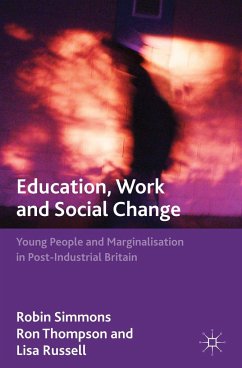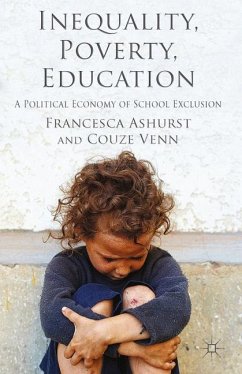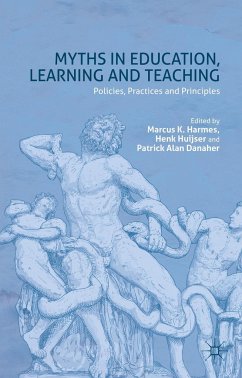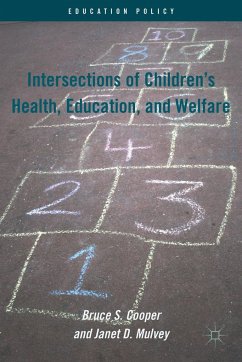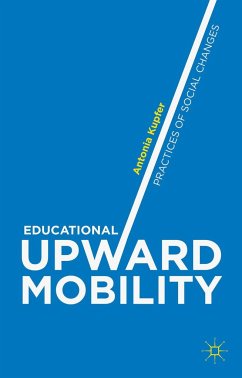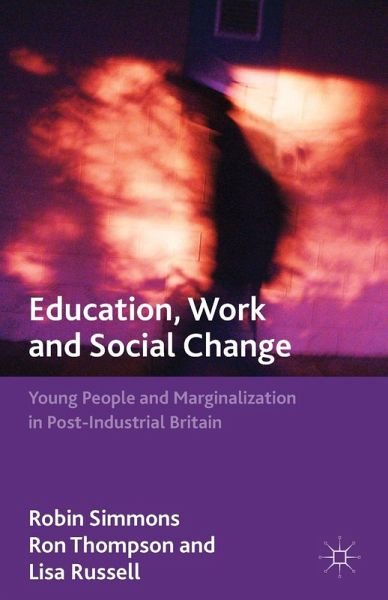
Education, Work and Social Change
Young People and Marginalization in Post-Industrial Britain
Versandkostenfrei!
Versandfertig in 6-10 Tagen
Weitere Ausgaben:

PAYBACK Punkte
19 °P sammeln!





Drawing on a longitudinal study of the lives of NEET young people, this book looks beyond dominant discourses on youth unemployment to provide a rich, detailed account of young people's experiences of participation and non-participation on the margins of education and employment, highlighting the policy implications of this research.
Robin Simmons is Professor of Education and Co-Director of the Centre for Research in Lifelong Learning and Social Justice at the University of Huddersfield, UK. He is co-author of NEET Young People and Training for Work: Learning on the Margins. Ron Thompson is Principal Lecturer in the School of Education at the University of Huddersfield, UK. He is co-author of NEET Young People and Training for Work: Learning on the Margins. Lisa Russell is Senior Research Fellow in the School of Education at the University of Huddersfield, UK. She is also author of Understanding Pupil Resistance - Integrating Gender, Ethnicity and Class: an Educational Ethnography.
Produktdetails
- Verlag: Palgrave Macmillan / Palgrave Macmillan UK / Springer Palgrave Macmillan
- Artikelnr. des Verlages: 978-1-137-33593-7
- 2014
- Seitenzahl: 257
- Erscheinungstermin: 17. Juni 2014
- Englisch
- Abmessung: 213mm x 137mm x 20mm
- Gewicht: 315g
- ISBN-13: 9781137335937
- ISBN-10: 1137335939
- Artikelnr.: 40547663
Herstellerkennzeichnung
Libri GmbH
Europaallee 1
36244 Bad Hersfeld
gpsr@libri.de
"Education, Work and Social Change is an enlightening read and would appeal to anyone interested in social policy, education and youth employment." - LSE Review of Books
"This book is a delight to read. Simmons, Thompson and Russell have produced a text that is both empirically grounded and theoretically informed. The case studies of the young people interviewed provide a moving authenticity. The authors confirm the message of several previous studies in this area. The problems of youth marginalisation lie in the intersection of the structural and personal. This is sociology at its best, as C. Wright Mills put it, at the junctions of history and biography and of private troubles and public issues. It should be read by all
"This book is a delight to read. Simmons, Thompson and Russell have produced a text that is both empirically grounded and theoretically informed. The case studies of the young people interviewed provide a moving authenticity. The authors confirm the message of several previous studies in this area. The problems of youth marginalisation lie in the intersection of the structural and personal. This is sociology at its best, as C. Wright Mills put it, at the junctions of history and biography and of private troubles and public issues. It should be read by all
Mehr anzeigen
politicians, journalists, youth workers and students seeking to understand some of issues surrounding marginalised young people." - Dr Ian Finlay, Oxford University Department of Education, UK
"Unlike populist and politically-driven perspectives on young people's lives that portray them as unmitigated 'bundles of pathologies', this book goes beyond conventional explanations and gets up close to young lives. Rather than presenting these young people as 'troublesome', disengagement is revealed as being a much more complex amalgam of poverty, neighbourhood conditions, changing labour markets, a training fallacy, and policy dysfunction. Thus construed, this book provides a refreshing view of re-engagement as being fundamentally about the reclamation of hope. A most enjoyable read!" - John Smyth, Research Professor of Education, Federation University Australia and co-author of Living on the Edge: Rethinking Poverty, Class and Schooling
"A real strength of this book lies in how it successfully connects the experiences of marginalised young people with the profound impact that the wider economic and social context has upon their attitudes and behaviours. It provides a well constructed intellectual framework within which to interpret and understand the lives of marginalised young people, something which is hugely valuable to both policy makers and practitioners alike. The use of longitudinal case studies, which place the voices and experiences of young people seldom heard at their centre, enables the reader to gain a real understanding of the struggles experienced by marginalised young people in an effort to gain some control over their own lives and destinies, in the face of what are deeply unequal economic and social contexts. The evidence provided by the case studies represents a powerful challenge to dominant policy discourses around worklessness, employability and participation. Its findings and conclusions are challenging, particularly in relation the question of whether participation in education or employment will in and of itself necessarily lead to meaningful advancement for marginalised young people. This well structured, accessible and thought provoking book makes an extremely valuable contribution to developing a fuller understanding of the lives, contexts, challenges and opportunities facing marginalised young people and should be widely read by both those who shape policy and who work directly with marginalised young people." - Sara Boyce, Policy Co-ordinator, Include Youth, Belfast, UK
"Unlike populist and politically-driven perspectives on young people's lives that portray them as unmitigated 'bundles of pathologies', this book goes beyond conventional explanations and gets up close to young lives. Rather than presenting these young people as 'troublesome', disengagement is revealed as being a much more complex amalgam of poverty, neighbourhood conditions, changing labour markets, a training fallacy, and policy dysfunction. Thus construed, this book provides a refreshing view of re-engagement as being fundamentally about the reclamation of hope. A most enjoyable read!" - John Smyth, Research Professor of Education, Federation University Australia and co-author of Living on the Edge: Rethinking Poverty, Class and Schooling
"A real strength of this book lies in how it successfully connects the experiences of marginalised young people with the profound impact that the wider economic and social context has upon their attitudes and behaviours. It provides a well constructed intellectual framework within which to interpret and understand the lives of marginalised young people, something which is hugely valuable to both policy makers and practitioners alike. The use of longitudinal case studies, which place the voices and experiences of young people seldom heard at their centre, enables the reader to gain a real understanding of the struggles experienced by marginalised young people in an effort to gain some control over their own lives and destinies, in the face of what are deeply unequal economic and social contexts. The evidence provided by the case studies represents a powerful challenge to dominant policy discourses around worklessness, employability and participation. Its findings and conclusions are challenging, particularly in relation the question of whether participation in education or employment will in and of itself necessarily lead to meaningful advancement for marginalised young people. This well structured, accessible and thought provoking book makes an extremely valuable contribution to developing a fuller understanding of the lives, contexts, challenges and opportunities facing marginalised young people and should be widely read by both those who shape policy and who work directly with marginalised young people." - Sara Boyce, Policy Co-ordinator, Include Youth, Belfast, UK
Schließen
Für dieses Produkt wurde noch keine Bewertung abgegeben. Wir würden uns sehr freuen, wenn du die erste Bewertung schreibst!
Eine Bewertung schreiben
Eine Bewertung schreiben
Andere Kunden interessierten sich für




